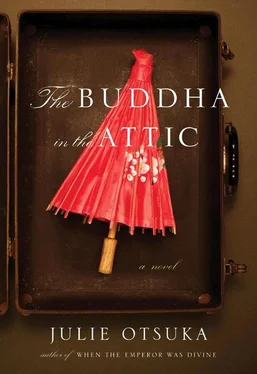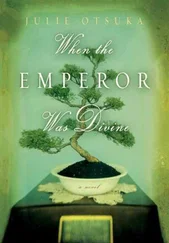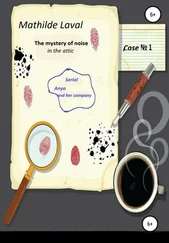Julie Otsuka
THE BUDDHA IN THE ATTIC
There be of them, that have left a name behind them, that their praises might be reported. And some there be, which have no memorial; who are perished, as though they had never been; and are become as though they had never been born; and their children after them.
— ECCLESIASTICUS 44:8–9
Barn’s burnt down—
now
I can see the moon.
— MASAHIDE
On the boat we were mostly virgins. We had long black hair and flat wide feet and we were not very tall. Some of us had eaten nothing but rice gruel as young girls and had slightly bowed legs, and some of us were only fourteen years old and were still young girls ourselves. Some of us came from the city, and wore stylish city clothes, but many more of us came from the country and on the boat we wore the same old kimonos we’d been wearing for years—faded hand-me-downs from our sisters that had been patched and redyed many times. Some of us came from the mountains, and had never before seen the sea, except for in pictures, and some of us were the daughters of fishermen who had been around the sea all our lives. Perhaps we had lost a brother or father to the sea, or a fiancé, or perhaps someone we loved had jumped into the water one unhappy morning and simply swum away, and now it was time for us, too, to move on.
ON THE BOAT the first thing we did—before deciding who we liked and didn’t like, before telling each other which one of the islands we were from, and why we were leaving, before even bothering to learn each other’s names—was compare photographs of our husbands. They were handsome young men with dark eyes and full heads of hair and skin that was smooth and unblemished. Their chins were strong. Their posture, good. Their noses were straight and high. They looked like our brothers and fathers back home, only better dressed, in gray frock coats and fine Western three-piece suits. Some of them were standing on sidewalks in front of wooden A-frame houses with white picket fences and neatly mowed lawns, and some were leaning in driveways against Model T Fords. Some were sitting in studios on stiff high-backed chairs with their hands neatly folded and staring straight into the camera, as though they were ready to take on the world. All of them had promised to be there, waiting for us, in San Francisco, when we sailed into port.
ON THE BOAT, we often wondered: Would we like them? Would we love them? Would we recognize them from their pictures when we first saw them on the dock?
ON THE BOAT we slept down below, in steerage, where it was filthy and dim. Our beds were narrow metal racks stacked one on top of the other and our mattresses were hard and thin and darkened with the stains of other journeys, other lives. Our pillows were stuffed with dried wheat hulls. Scraps of food littered the passageways between berths and the floors were wet and slick. There was one porthole, and in the evening, after the hatch was closed, the darkness filled with whispers. Will it hurt? Bodies tossed and turned beneath the blankets. The sea rose and fell. The damp air stifled. At night we dreamed of our husbands. We dreamed of new wooden sandals and endless bolts of indigo silk and of living, one day, in a house with a chimney. We dreamed we were lovely and tall. We dreamed we were back in the rice paddies, which we had so desperately wanted to escape. The rice paddy dreams were always nightmares. We dreamed of our older and prettier sisters who had been sold to the geisha houses by our fathers so that the rest of us might eat, and when we woke we were gasping for air. For a second I thought I was her .
OUR FIRST FEW DAYS on the boat we were seasick, and could not keep down our food, and had to make repeated trips to the railing. Some of us were so dizzy we could not even walk, and lay in our berths in a dull stupor, unable to remember our own names, not to mention those of our new husbands. Remind me one more time, I’m Mrs. Who? Some of us clutched our stomachs and prayed out loud to Kannon, the goddess of mercy— Where are you? —while others of us preferred to turn silently green. And often, in the middle of the night, we were jolted awake by a violent swell and for a brief moment we had no idea where we were, or why our beds would not stop moving, or why our hearts were pounding with such dread. Earthquake was the first thought that usually came to our minds. We reached out for our mothers then, in whose arms we had slept until the morning we left home. Were they sleeping now? Were they dreaming? Were they thinking of us night and day? Were they still walking three steps behind our fathers on the streets with their arms full of packages while our fathers carried nothing at all? Were they secretly envious of us for sailing away? Didn’t I give you everything? Had they remembered to air out our old kimonos? Had they remembered to feed the cats? Had they made sure to tell us everything we needed to know? Hold your teacup with both hands, stay out of the sun, never say more than you have to .
MOST OF US on the boat were accomplished, and were sure we would make good wives. We knew how to cook and sew. We knew how to serve tea and arrange flowers and sit quietly on our flat wide feet for hours, saying absolutely nothing of substance at all. A girl must blend into a room: she must be present without appearing to exist . We knew how to behave at funerals, and how to write short, melancholy poems about the passing of autumn that were exactly seventeen syllables long. We knew how to pull weeds and chop kindling and haul water, and one of us—the rice miller’s daughter—knew how to walk two miles into town with an eighty-pound sack of rice on her back without once breaking into a sweat. It’s all in the way you breathe . Most of us had good manners, and were extremely polite, except for when we got mad and cursed like sailors. Most of us spoke like ladies most of the time, with our voices pitched high, and pretended to know much less than we did, and whenever we walked past the deckhands we made sure to take small, mincing steps with our toes turned properly in. Because how many times had our mothers told us: Walk like the city, not like the farm!
ON THE BOAT we crowded into each other’s bunks every night and stayed up for hours discussing the unknown continent ahead of us. The people there were said to eat nothing but meat and their bodies were covered with hair (we were mostly Buddhist, and did not eat meat, and only had hair in the appropriate places). The trees were enormous. The plains were vast. The women were loud and tall—a full head taller, we had heard, than the tallest of our men. The language was ten times as difficult as our own and the customs were unfathomably strange. Books were read from back to front and soap was used in the bath. Noses were blown on dirty cloths that were stuffed back into pockets only to be taken out later and used again and again. The opposite of white was not red, but black. What would become of us, we wondered, in such an alien land? We imagined ourselves—an unusually small people armed only with our guidebooks—entering a country of giants. Would we be laughed at? Spat on? Or, worse yet, would we not be taken seriously at all? But even the most reluctant of us had to admit that it was better to marry a stranger in America than grow old with a farmer from the village. Because in America the women did not have to work in the fields and there was plenty of rice and firewood for all. And wherever you went the men held open the doors and tipped their hats and called out, “Ladies first” and “After you.”
Читать дальше













